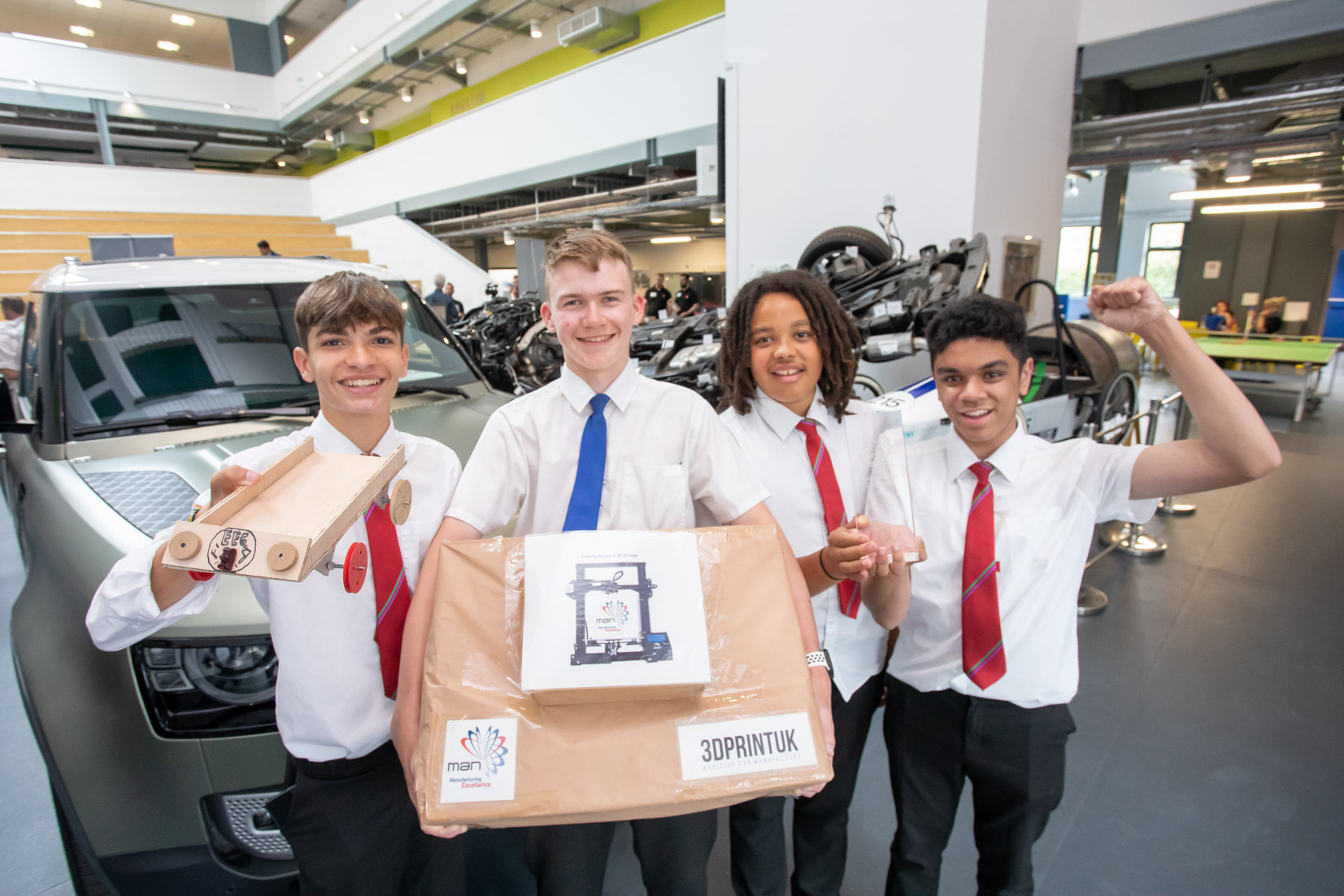Three schools from the Black Country and Warwickshire have been crowned as the main winners at one of the biggest independent manufacturing-education events in the UK.
Ernesford Grange Community Academy, Great Wyrley Academy and WMG Academy for Young Engineers Coventry beat off competition from five other rivals to take the Manufacturing, Innovation and Efficiency titles respectively at the Design & Make Challenge 2022.
The trio were joined on the podium by Alcester Grammar School, who claimed the first ever ‘Communications’ prize for its use of social media in promoting the day.
Organised by the Manufacturing Assembly Network (MAN), more than 35 students swapped their daily lessons for the chance to test out their design, engineering, prototyping and communication skills at the all-day event held at WMG Academy for Young Engineers in Solihull.
Teams of four Year 11 and Year 12 pupils were set the challenge of using basic materials and tools to make a vehicle that could be propelled by a falling weight. They tested their devices, modified them and then raced them on a purpose-built 7.5m long track to see which one would complete the distance in the fastest possible time – a race that WMG Academy Coventry won in just 3.64 seconds.
“Now, more than ever, we need young people to choose engineering and manufacturing as a career and we’re not going to change perceptions by sitting on our hands, doing nothing,” explained Austin Owens, founder of Grove Design (Pembridge) Ltd and Co-Chair of the Manufacturing Assembly Network.
“This was a comeback for the Design & Make Challenge after a Covid-19 enforced break and we were delighted to see the appetite to take part was still there. I have to say the task was the hardest yet and the young people really embraced it.”
He went on to add: “The atmosphere in the room was amazing and I’m convinced we’ve seen some of the engineers of the future here, engineers that will go on and improve the way we live for the better.”
Ernesford Grange Community Academy, Great Wyrley Academy and WMG Academy Coventry all received a 3D printer for their efforts.
This latest technology was kindly donated by 3DPRINTUK, who are specialists in low volume production using state-of-the-art powder bed fusion 3D printing systems with polymer materials.
Nick Allen, Managing Director of 3DPRINTUK, commented: “We are both proud and delighted to sponsor the Design & Make Challenge 2022.
“The competition is a great fit for us. By donating 3D printers to the winners, it allows the next generation of engineers and manufacturers to learn in a hands-on way about the advantages – and disadvantages – of 3D printing for any given application. It’s something we are passionate about both now and for the future.”
Joining Alcester Grammar School, Ernesford Grange Community Academy, Great Wyrley Academy and WMG Academy Coventry at the Design & Make day were Gospel Oak School, Lawrence Sheriff School, Southam College and WMG Academy Solihull.
Peter Davies, Chief Executive of James Lister & Sons and Co-Chair of the Manufacturing Assembly Network, added his support: “The day is all about bringing sound design and engineering principles to the fore to solve a topical industrial issue, with young people encouraged to work together to develop innovative designs and then build a product they can test against their peers.
“Apprentices from MAN companies and graduates from WMG at the University of Warwick, were working with the groups and talking about their own experiences following a career in manufacturing and some of the skills they may need to realise their ambition.
“All the feedback we received was positive, which excites us about doing it again next year. We now urge other manufacturers to look at how they can play a role in helping promote our sector to young people.”
Dr Mark Swift, Head of SME Programmes at WMG at the University of Warwick, concluded: “Design & Make is a wonderful example of how to inspire future engineers – making it real and helping to bridge the skills gap, particularly in small manufacturing and engineering businesses.
“SMEs are the lifeblood of manufacturing in the UK, and they offer a wonderful, rich, challenging and rewarding destination for the next generation of engineers. They get access to all parts of the business, from working with customers and suppliers to the management team and gaining experience on the shop floor – all of this will accelerate their future career.”
About the Manufacturing Assembly Network
Formed in 2006, The Manufacturing Assembly Network is made up of Alucast, Barkley Plastics, Brandauer, Grove Design, James Lister & Sons, KimberMills International, Muller Holdings, Nemco and PP Control & Automation.
The eight sub-contract manufacturers and specialist engineering design agency form a unique global collective that works together to share best practice and secure contracts for UK industry.
It is the third year that the group has held the Design & Make Challenge and earlier competitions have resulted in 352 hours of hands-on manufacturing experience for young people, seven MAN company visits completed by schools and over £25,000 of press coverage to raise the profile of the sector.
